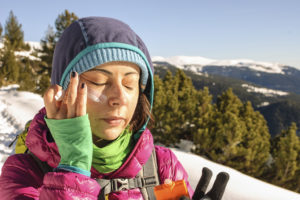
Ahhh, winter. Cold days. Cloudy skies. And no end in sight.
Even when the sun hides, you should use sunscreen every day, according to Leon Oostendorp, MD.
As director of Spectrum Health Cancer Center’s Melanoma Clinic, Dr. Oostendorp sees too many cases of skin cancer that may have been avoided with sunscreen.
“Most people don’t realized that UV rays can be just as damaging in winter as they are in summer,” he said. “About 80 percent of the sun’s rays can penetrate clouds.”
Dr. Oostendorp recommends using a broad-spectrum sunscreen with a SPF of 30 or higher—especially if you’ll be outside shoveling, sledding, skiing or snowshoeing. And be generous: Apply at least a teaspoon of lotion on your face.
Winter can also bring plenty of other skin problems with freezing temperatures outside and hot, dry air inside. This harsh combination strips our skin of its moisture, leading to dry, irritated and itchy skin, and raising the risk of eczema and psoriasis flares.
Use these 8 tips to ward off winter skin woes:
1. Take shorter showers
Long, hot showers and baths strip skin of its moisture. Shorten the length of time you are in the water and use warm or lukewarm water instead. Make sure to pat—not rub—your skin when drying off.
2. Apply moisturizer
After washing up at night, lock in the moisture while you sleep with a good moisturizer. Try using thicker, oil-based ointments and creams instead of water-based lotions.
3. Avoid harsh products
Mild soaps, body washes and cleansers that are moisturizing are best for delicate skin. Beware of alcohol-based astringents and toners or acne treatment products, which can further dry out the skin. You may want to cut back on your use of these products in the winter.
4. Cover up
Reduce the amount of skin exposed to cold air by wearing hats, gloves, scarves, coats and boots. Remove wet clothing such as socks and gloves as soon as possible to prevent further skin irritation.
5. Use sunscreen
The damaging rays of the sun do not hibernate in winter. Apply a broad-spectrum sunscreen with a SPF of 30 or higher to exposed skin.
6. Don’t lick your lips
Instead of adding moisture, saliva has a dehydrating effect on thin lip skin. Prevent chapped lips by applying a moisturizing lip balm and covering up with a scarf when you go outside.
7. Moisten the air
Use a humidifier to combat dry, furnace-blasted air indoors. Keep the humidity level at about 40 percent.
8. Chose the right moisturizer
Inexpensive products often work just as well as the pricier alternatives.
For hands, try products with dimethicone. The ingredient prevents water loss by forming a hydrating barrier on the skin. Plus, it has a nice, silky feel.
 /a>
/a>
 /a>
/a>
 /a>
/a>